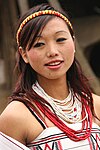For the surname, see Kabui (surname). Ethnic group
 Rongmei/Kabui women Rongmei/Kabui women | |
| Total population | |
|---|---|
| 170,800 (2011 Census) | |
| Regions with significant populations | |
| Northeast India | |
| Languages | |
| Rongmei language | |
| Religion | |
| Tingkao Ragwang Chapriak,Christianity, Poupei Chapriak. | |
| Related ethnic groups | |
| Zeme, Liangmai |
The Rongmeis (also known as Kabui) are one of the Naga ethnic communities of North-East India. They are recognised as a scheduled tribe (STs) in the Constitution of India.
They share similarity with their kindred tribes of Zeme, Liangmai and Inpui, which together are known as Zeliangrong. Some historians and anthropologists have earlier recorded them as Kabui along with Inpui people.
Festival
The Gaan-Ngai festival (post-harvest festival) is celebrated annually between December and January. It follows the lunar calendar and is celebrated on the 13th day of the Wakching or Gaan Ngai buh. It is celebrated to worship the Supreme God Haipou Tingkao Ragwang.
Rebellion
During the Colonial period, under the leadership of Haipou Jadonang and his successor Rani Gaidinliu, the Rongmeis along with other Zeliangrong tribes rebelled against British rule in the 1930s.
See also
References
- "The Constitution (Scheduled Tribes): Order, 1950". Ministry of Law and Justice (India).
- "Rongmei celebrates Chakaan Gaan Ngai 2024 in Kohima". Morung Express. Morung Express. 25 January 2024. Retrieved 6 July 2024.
- G. K. Ghosh (1 January 1992). Tribals and Their Culture in Assam, Meghalaya, and Mizoram. Ashish Publishing House. ISBN 978-81-7024-455-4. Retrieved 5 June 2013.
- Kusumlata Nayyar (2002). Rani Gaidinliu. Ocean Books. ISBN 978-81-88322-09-1. Retrieved 12 June 2013.
| List of Naga tribes | |
|---|---|
